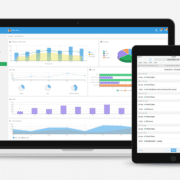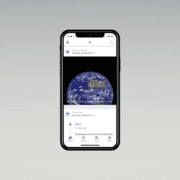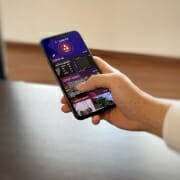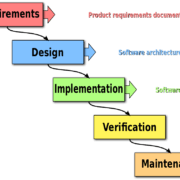How Can Mobile Apps Help Improve Company Culture?
Company culture can make or break a business. And that’s because company culture consists of the formal and informal behaviors, values, and systems that impact customers and employees. But it’s easy to ignore or misunderstand these facets of an organization since few people can tell apart these behaviors and values at face value.
Yet we can easily identify the organizations that have a good company culture, and here’s how? We look out for companies with good customer service, high employee retention rates, solid financial results, and boast a culture of innovation.
Another way to identify good company culture is by surveying the staff of an organization. And we’d ask them the following: How well do they communicate with each other? What is the decision-making process like within the organization? Does the organization acknowledge and fairly reward staff contributions? And how are employees hired, promoted, and laid off?
Surveying an organization’s customers makes sense too. And we’d want to know the following: How well does the company respond to customer complaints and feedback? Do the products and services of the company meet or surpass expectations? And does the company delight and surprise customers with innovative products and services?
Think of how customers and employees perceive a company such as Apple. We’re willing to bet that it’s mostly positive, even though it isn’t perfect. But more likely than not, expect Apple to improve company culture constantly to stay ahead of the curve.
Now, you may be wondering what all this means for your organization. Actually, it means far more than you’d think, especially if you bring mobile apps into the equation. We look into how mobile apps can improve company culture in more detail below!
Improve Company Culture With Powerful Communication And Collaborative Tools
Your employees may have multiple email accounts and use several communications tools to get work done. But that’s an administrative and security nightmare, especially if you have staff coming into the office and working remotely. Furthermore, they may use desktop PCs and various mobile devices to complete daily tasks, increasing the complexity of your systems.
Relying on third-party vendors to provide essential productivity software makes sense if you’re a startup. But you’ll eventually reach a roadblock since you’ll likely find this software doesn’t scale with your needs or lacks features essential to a growing company. Then, there’s the case that not all your productivity software integrates well with your existing or upcoming systems.
That’s why you’re better off working with an experienced developer such as NS804 to create a custom solution for your needs. Together, you can build a mobile app that provides staff with a tightly integrated mobile app for communications and collaborative purposes. And you can allow them to log in with a secure two-factor authentication (2FA) or even passwordless authentication.
Your staff will become more productive, as they will no longer rely on disparate pieces of software to get work done. They can work within a singular all-in-one solution with a cohesive user interface (UI) and user experience (UX). Furthermore, they won’t have to wait for a third-party vendor to release features and updates when they’re most needed. And there’s a risk that new features may take months or years to arrive, and sometimes — never!
But with a custom mobile app, this isn’t a problem. You can add new features on short notice and have these implemented to your specifications. And staff will feel confident knowing they have access to the most productive tools tailor-made for them.
A Mobile-First Approach Enhances Company Culture
We mentioned earlier that you could be using desktop PCs and mobile devices. There’s also the possibility that you could be relying on web apps for some of your mission-critical business processes. If that’s the case, it’s a messy approach that will make your systems and staff workflows more inefficient than they should be.
But the good news is that you can streamline all this with a mobile-first approach. The latest smartphones and tablets are powerful enough for most business tasks. And if you opt for native app development, your mobile app will boast high performance and speed on these devices. Thus, it’s no longer necessary to have most, if not all, of your staff using desktop PCs or laptops.
And if you have staff that works outside the office or remotely, they’ll appreciate using lightweight devices with small form factors. Also, consider those employees that don’t feel comfortable or like using desktop PCs or laptops at home. Either because they feel intimidated by these or need a break from the computer screen and desk when not in the office.
But a smartphone or tablet feels more accessible, especially to non-tech-savvy employees. And with an intuitive mobile app, they can get work done while sitting on their couch, back porch, or while waiting for an order at their favorite restaurant. Knowing that they can quickly complete tasks on the go and in any environment helps improve company culture and staff satisfaction.
Staying Connected With Customers
While it’s a wise choice to develop a custom app to improve staff efficiency, you should also consider your customers. And think of how you will build an effective and sustainable communications pipeline to connect with them. Now we know what you may be thinking, “Why not use Facebook or Twitter to stay in touch with customers?”
While social media platforms do a reasonably good job at connecting businesses and customers, they have several shortcomings:
- Firstly, you don’t have ownership of these platforms and are subject to their terms and policies, which means you could lose access to your account for reasons within or beyond your control.
- Secondly, you’re only a business in a sea of businesses on these platforms, so it’s challenging to stand out or prevent your customers from discovering competitors with a few clicks.
- Thirdly, you can’t create your own UI/UX and messaging functionality and are strictly reliant on what each social media platform provides, which may not meet your expectations and requirements.
- And finally, you can’t directly contact users that engage with your business unless they specifically provide you with their contact details and email addresses.
From a business standpoint, relying exclusively on social media to stay in touch with customers isn’t a good move. You’re better off building an email list via your website, especially if you want to build long-term relationships with customers. But a website isn’t the only avenue to help you accomplish this goal, as you can also utilize a mobile app.
Furthermore, a custom-built mobile app allows you to present your products and services exactly how you want. And you can keep your UI/UX and identity on-brand and tailor your messaging features so that they’re satisfactory to you and your customers.
The Bottom Line
As a business leader, one of your key goals is to improve company culture. While this isn’t easy, you can accomplish much by utilizing the methodologies and tools that will impact customers and employees positively. And the good news is that one or more custom-built mobile apps can bring about changes that can radically transform your organization for the better. Contact NS804 today to learn how we’ll help you create mobile apps that mean business!











 https://unsplash.com/photos/qC2n6RQU4Vw
https://unsplash.com/photos/qC2n6RQU4Vw
Leave a Reply
Want to join the discussion?Feel free to contribute!